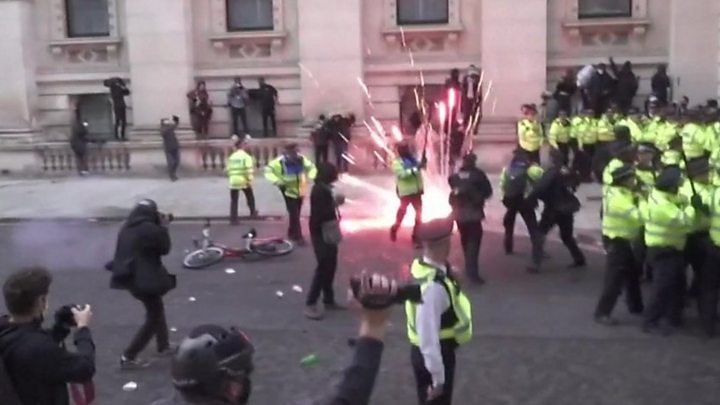Boris Johnson: Anti-racism protests 'subverted by thuggery'

Prime Minister Boris Johnson has said anti-racism protests at the weekend were "subverted by thuggery" after some demonstrators clashed with police.
Mr Johnson said people had the right to protest but engaging in violence was a "betrayal" to the protesters' cause.
Thousands of people attended largely peaceful demonstrations in cities across the UK at the weekend.
But unrest in the capital on Sunday led to eight officers being injured and 12 people being arrested.
The Metropolitan Police's Superintendent Jo Edwards said following a "predominantly peaceful protest", officers were faced with further "scenes of violence and disorder" which were "entirely unacceptable".
The majority of the arrests in London were for public order offences and one for criminal damage.
Mr Johnson condemned the violence, posting on Twitter: "People have a right to protest peacefully & while observing social distancing but they have no right to attack the police. These demonstrations have been subverted by thuggery - and they are a betrayal of the cause they purport to serve. Those responsible will be held to account."
Thousands of protesters gathered on Saturday and Sunday in London, as well as cities across the UK including Bristol, Manchester, Wolverhampton, Nottingham, Glasgow and Edinburgh.
Protests were generally peaceful, with aerial footage showing thousands of demonstrators flooding the roads outside the US embassy in Vauxhall, south London, before marching towards Parliament Square and Downing Street.
But there were some clashes with police, particularly in the capital.
A police officer received a head injury and a Section 35 dispersal order was issued on Sunday night until 06:00 on Monday.
As darkness fell, lines of police in riot gear took up positions to contain a small group of protesters in Westminster, the BBC's Tom Symonds said.
Bottles were thrown at officers and police issued a dispersal order for the City of Westminster, compelling people to leave the area.
And in Warwickshire, protesters caused the closure of the M6 for around an hour following on from the demonstrations in Coventry city centre.
Slave trader's statue torn down
On Sunday protesters in Bristol used ropes to pull down the bronze statue of Edward Colston, a prominent 17th Century slave trader, who has been a source of controversy in the city for many years - his legacy can still be seen on Bristol's streets, memorials and buildings.
After the statue was toppled, a protester was pictured with his knee on the figure's neck - reminiscent of the video showing George Floyd, the black man who died while being restrained by a Minnesota police officer.
The statue was later dragged through the streets of Bristol and thrown into the harbour. The empty plinth was used as a makeshift stage for protesters.
Home Secretary Priti Patel condemned the tearing down of the statue as "utterly disgraceful" and Avon and Somerset Police confirmed there would be an investigation into the "act of criminal damage".
Elsewhere, in Parliament Square, the statue of Sir Winston Churchill was sprayed with graffiti, and a Black Lives Matter sign attached - an act described as "stupid and counterproductive" by foreign office minister James Cleverly.
Meanwhile, opposition MPs have criticised comments made by Health Secretary Matt Hancock that protests were fuelled by events in America "rather than here".
Shadow justice secretary David Lammy said that racism and prejudice exist in the UK, as well as across the Atlantic, and that to suggest there is only a problem in the US "shows real ignorance".
Mr Lammy tweeted: "People in this country are not only showing solidarity with George Floyd and other African Americans. We must turn this moment into one of change and justice in the UK too."
How George Floyd's death resonated in the UK
Have you been affected by the issues raised in this story? Share your experiences by emailing haveyoursay@bbc.co.uk.
Please include a contact number if you are willing to speak to a BBC journalist.